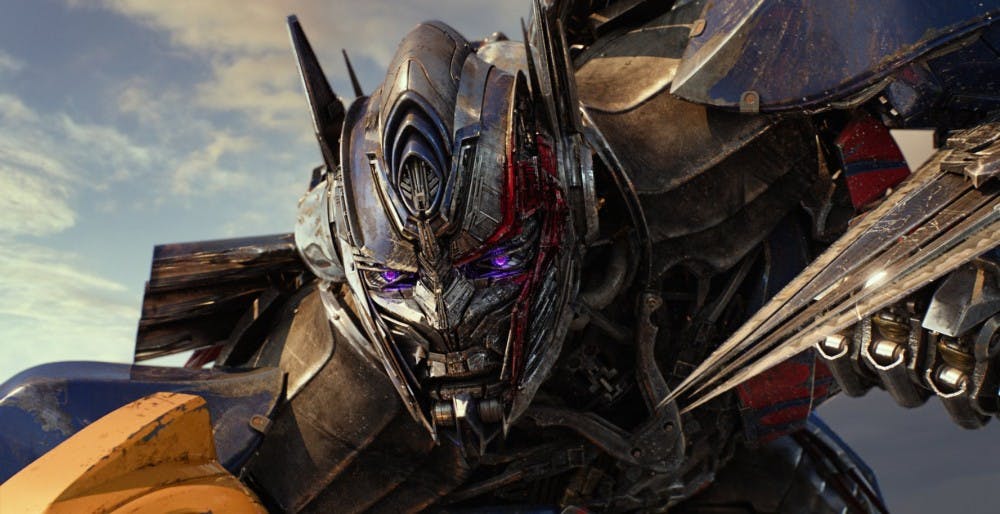By Simon Tessmer
Editor's Note: There Will Be Criticism is a weekly column by Simon Tessmer, a film student at MSU. Tessmer's other reviews can be read on his blog.

IMDB | Paramount Pictures/Bay F - © 2017 Paramount Pictures. All Rights Reserved. HASBRO, TRANSFORMERS, and all related characters are trademarks of Hasbro.
By Simon Tessmer
Editor's Note: There Will Be Criticism is a weekly column by Simon Tessmer, a film student at MSU. Tessmer's other reviews can be read on his blog.
Transformers: The Last Knight represents a landmark in the refinement of Michael Bay’s powerful style. It’s long, loud, oppressive, and dumb in a manner more effective than his previous films, and in this sense perhaps deserves a perfect rating. However, I find Bay’s work so forcefully stupid that the thought of lending it even tacit approval is repulsive.
Knight stars Mark Wahlberg as Cade Yeager, an inventor trying to stay alive in the dystopian post-Age of Extinction (2014) future. After receiving a mysterious talisman from a dying Transformer, he gets roped into a complicated plot to destroy the planet through the efforts of Quintessa (Gemma Chan), which involve mysterious giant horns sprouting up across the world, a traitorous turn from Optimus Prime (Peter Cullen), a family line starting at the Knights of the Round Table and ending in Laura Haddock (Viviane Wembly), a quirky British historian (Anthony Hopkins), and Megatron (Frank Welker).
Though with Bay this criticism feels like beating a dead horse, it’s always worth mentioning his racism. The number of black-coded robots in the film could qualify Knight as a minstrel show, running the gamut from mentally deficient “jive” talking robots to “thug” bots who wear gold chains, and in one instance literally sing “Free at Last” while dancing (not to mention the return of our beloved yellow-faced samurai robot Drift, voiced by Ken Watanabe). There’s an ineffable quality in Bay’s cinematic assault on the senses that smooths over the rough edges on his bigotry, and works to make such stereotypes feel okay. They are not okay. Bay is trading on cultural racism to quickly and lazily imbue his Transformers with identifiable qualities (whether that be comic stupidity, evil, or physical prowess), and as a result continues to reinforce the ‘naturalness’ of such racial assumptions.
Knight also continues Bay’s trend of treating cinema in the most blatantly capitalistic way possible, in manners ranging from comically clear product placement to the obviously rushed nature of Knight’s production. The most head-scratching evidence of this comes in the form of Knight’s aspect ratio, which switches from full-screen to IMAX wide-screen at frequent and seemingly random intervals. Another lazy element is the bare nature of Knight’s script rewrites. Few narrative arcs are followed coherently across the film’s considerable runtime, resulting in much of the film’s initial story setups being discarded in its latter half. Optimus spends roughly ten minutes under the influence of evil, Izabella (Isabela Moner) is introduced as Cade’s surrogate daughter yet is wholly abandoned an hour into the film, and an elaborate introduction of new Decepticons proves worthless when the new robots aren’t at all necessary to Knight’s story.
I could go on with Bay’s tone-deaf sense of humor, inability to convey action in a coherent manner, and ignorance of filmmaking basics, but such would be most criticisms of all his films. I believe this speaks to the power of Michael Bay, where a discussion of any of his works devolves into a discussion of the director himself, a contemplation on his oeuvre and his status as an American auteur. Surely the mark of a great directorial voice is the transformation of their name into a genre, as Michael Bay has done with the construction of the “Michael Bay film.” Few living American directors share this distinction, and as such dismissing Bay as simply stupid is a naïve approach to his work. His cultural handprint extends far across the contemporary media landscape, and if we are to countermeasure this viral infection, we must apply sober thought to work that is markedly thoughtless.
Support student media! Please consider donating to The State News and help fund the future of journalism.